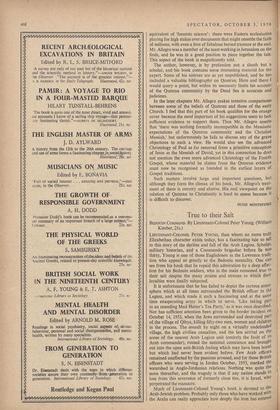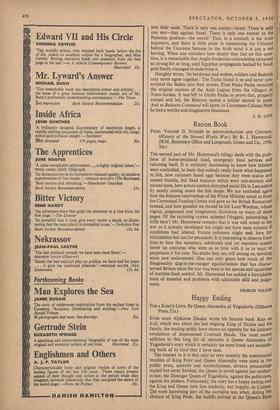True to their Salt
BEDOUIN COMMAND. By Lieutenant-Colonel Peter Young. (William Kimber, 21s.)
LIEUTENANT-COLONEL PETER YOUNG, than whom no more truly Elizabethan character exists today, has a fascinating tale to tell in this story of the decline and fall of the Arab Legion. Scholar, military historian, and a Commando brigadier before lie was thirty, Young is one of those Englishmen in the Lawrence tradsr tion who appeal so greatly to the Bedouin mentality. One can see from his book that he repaid this admiration by a deep affec- tion for his Bedouin soldiers, who in the main remained true to their salt despite the many strains and stresses to which their loyalties were finally subjected.
It is unfortunate that he has failed to depict the curious atmn' sphere which at all times surrounded the British officer in the Legion, and which made it such a fascinating and at the salve time exasperating army in which to serve. 'Like taking part in an unending Mad Hatter's Tea Party,' as it was once described. Nor has sufficient attention been given to the border incident on October 14, 1953, when the Jews surrounded and destroyed part of the village of Qibya, killing fifty-two men, women and children in the process. The assault by night on a virtually undefended village, the high civilian casualties, and the late arrival on the scene of the nearest Arab Legion unit (entirely the fault of Its Arab commander), roused the national conscience and brought out into the open anti-British feeling which may have been latent but which had never been evident before. Few Arab officers remained unaffected by the passions aroused, and for those British officers who were serving in Jordan October, 1953, marked the watershed in Anglo-Jordanian relations. Nothing was quite the same thereafter, and the tragedy is that if any nation stands to lose from this severance of formerly close ties, it is Israel, who perpetrated the massacre.
Much of Lieutenant-Colonel Young's book is devoted to the Arab-Jewish problem. Probably only those who have worked with the Arabs can really appreciate how deeply the iron has entered
into their souls. There is only one enemy—Israel. There is only one war—that against Israel. There is only one answer to the Palestine problem—the sword! That, in a nutshell, is the Arab argument, and there is little point in mentioning the Colossus behind the Caucasus because to the Arab mind it is just a red herring. When one considers how deeply they feel on this ques- tion, it is remarkable that Anglo-Jordanian comradeship remained so strong for so long, until Egyptian propaganda backed by Saudi gold finally managed to undermine it.
Doughty wrote, 'As herdsmen and wolves, soldiers and Bedouin may never agree together.' The Turks found it so and never con- scripted the Bedou into their armies. Even Peake Pasha recruited the original nucleus of the Arab Legion from the villagers of Trans-Jordan. It was left to Glubb Pasha to prove that, properly trained and led, the Bedouin makes a soldier second to none. And as Bedouin Command will show, in Lieutenant-Colonel Peter he had a worthy and imaginative lieutenant. I. D. LUNT



















































 Previous page
Previous page